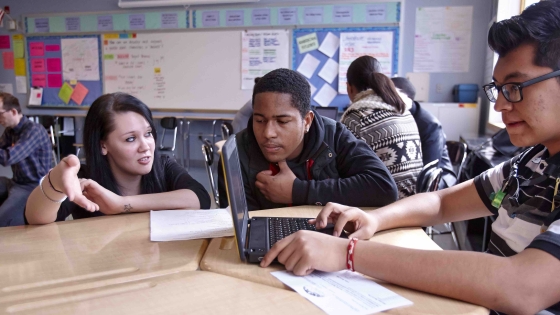Exploring NYC Students’ Perceptions of School-Based Support for College and Career Transitions
By John Sludden and James J. Kemple
(October 2024)
Preparing students for both college and careers has been an explicit national policy objective for more than a decade. Recently, the “College for All” discourse prominent in the early 2000s has faded as more resources and attention have been focused on career-connected learning. New York City Public Schools (NYCPS) has been at the forefront of this shift, establishing a goal that all students have a “pathway to and preparation for a rewarding career and long-term economic security.” As part of this push, NYCPS has expanded apprenticeship and internship opportunities and codified the expectation that every high school student receives individualized career and college advising and planning support.
Despite the increased emphasis on college and career preparation, high school advising remains understudied, including in the context of formal career and technical education (CTE) programs. Together with partners from the CTE Research Network, the Research Alliance is engaged in a multi-state project that is investigating the role of advising in students’ postsecondary transitions.
Our current report examines New York City high school students’ perceptions of and experiences with college and career planning, the extent to which planning support differs across students and schools, and the link between planning support and short-term student outcomes. Key findings include:
- While college and career planning support were present in all of the high schools in our sample, students in CTE high schools reported more career-oriented support than students in non-CTE settings.
- This additional career planning support did not appear to come at the expense of college planning support—which students described receiving at similar levels across school types.
- In both CTE- and non-CTE settings, seniors who reported more support for the exploration of college and career options (e.g., learning about what is needed to apply for college, learning about different careers, etc.) often reported less experiential college and career planning support (e.g., attending a college fair, visiting a college campus, having an internship, etc.). Students with more experiential support tended to have stronger prior academic performance.
- We also find suggestive evidence that specific types of college and career support are associated with key student outcomes, including participation in an internship, on-time high school graduation, and four-year college enrollment.
Our study draws on the Senior Exit Survey administered in 2018, which was issued to only about half of NYC’s high schools. Since that time, NYCPS has mandated the documentation of individualized advising plans for all high school students, meaning it is quite possible that students’ experiences with advising have changed in recent years. Still, we believe our findings highlight challenges that will need to be surmounted to ensure all students are prepared for college and careers.
The larger project, “Exploring the Role and Effects of High School Advising,” explored staff and student experiences with advising in New York City and North Carolina, as well as the impact and implementation of North Carolina’s career coaching program. The Research Alliance contributed to a forthcoming synthesis of the project’s findings, which provides further insight into the relationship between high school advising and CTE students’ transitions to postsecondary education and the workforce.
Our partners on this work were MDRC, RAND, and UNC Greensboro’s SERVE Center. The project was supported by the Institute of Education Sciences, U.S. Department of Education, through a supplement to Grant #R305H190036. For additional details on the methodology and findings, please see the Technical Appendix.

